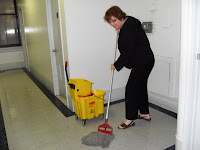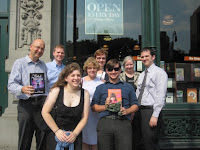
One of the highlights of this years SCBWI National Conference was having the opportunity to hear Elizabeth Law of Egmont Books talk. (Yes, that's her giving us a glimpse of her glamorous, N.Y. publishing life!) She gave a number of breakout sessions, along with a keynote, and each time we were struck by how knowledgeable and candid she was. A real treat! As Vice President and Publisher of Egmont Books, she was certainly in a position to give us a wealth of information on the industry--which she did. She also said some things that are still reverberating around the blogosphere, which she will recap for us here.
Please join Mary and I in welcoming Elizabeth Law to Shrinking Violets, where she has graciously agreed to answer some questions for us. (My personal favorite? Her answer to the second question!)
SVP: You gave us all a tremendous gift at your workshop—granting us authors permission to contact our editors. It was also a huge call to action for a number of us. Were you surprised at how very many authors had such a hard time with this issue? Could you talk a little bit about this for our blog readers who didn’t get a chance to hear you at the conference?I was really surprised at how many writers, including well-established authors, said they had trouble picking up the phone to call their editors. Even your question surprises me: “granting us authors permission to contact our editors.” Why do you feel you need permission? You and your editor both want to make your book a success, and you have every right to have your questions answered. It is much better to ask about what you need to know than to worry at home or to ask questions of people who won’t know the answer, like your well-intended friends. Truthfully, a lot of trouble can come out of people making up stories in their minds when they don’t pick up the phone or send an email. We’d much rather you just ask us. And it’s our job to have a strong working relationship with the writers we publish.
But I do appreciate the respect that your question shows, and that everyone seems to acknowledge that editors are busy. We certainly are, but who isn’t these days? You don’t want to call or email your editor every day, although sometimes, in the middle of a revision, or in the middle of making changes or working on jacket flap or whatever, a lot of small emails in quick succession is appropriate. But if you have questions about your release date, about your jacket flap, about a bookstore appearance, about an idea for the next book, or about a character, for example, you need to ask it! Here’s what I suggest. Call up your editor, or email him or her, and say “I’d love to set up a 15 minute call to go over some things” and then keep a list to go over on your call. Or keep a list of running questions and then send them in one email.
This is not just my opinion. Before Egmont, I worked at Simon & Schuster Books for Young Readers and Viking Children’s Books. Communication is always, always a positive.
SVP: Mary and I took great comfort when you said that in spite of all the promotional demands on an author, the writing is still the most important part of the equation. Do you have some words of comfort for any writers out there who are terrified or paralyzed by all these perceived marketing requirements?Boy oh boy, do I!
Just write your heart out. I promise you that’s what matters. I would

much, much rather find a great, unusual, distinctive book by a phobic writer covered in oozing sores who lives in a closet than a decent but not amazingly original book by the world’s best promoter. I could sell the former a lot better, too.
We are all in this business because we love good books. And a lot of really good, really unusual books have been successful recently. Have you noticed? Savvy, The Hunger Games, and When You Reach Me all come to mind. And I hope some of Egmont’s books will join that list soon. Books like Candor by Pam Bachorz and the Candle Man books by Glenn Dakin.
Can it help if you are out there, blogging or tweeting or speaking about your book? Yes, it can. But nothing works as well as a good book itself. Because your editor, your publisher, your agent, your friends, gatekeepers, and other people who love good books will fall in love with it and start talking about it even if you don’t.
SVP: Do you feel that the internet and social media should be used in different ways for different kid lit genres? Is there a different promotional strategy for YA versus MG versus picture books?Everything about online promotion is pretty unproven right now. Publishers and authors are trying all sorts of things and seeing what works. One thing that does seem to be working is free content, such as making a chapter or two of your book available online, or making a full download available of your book for one day. For the book Skullduggery Pleasant by Derek Landy, Harper made the audio book available for free on their website, but only in streaming format. That is, you have to play the audio book from the site. You can’t download it to your iPod. I think that’s a neat promotional idea.
I don’t know yet what is working best for picture books, but I’d love to find out. YA may be the easiest to promote online, since teen readers read blogs, are on social-networking sites, and there are no restrictions about capturing their information, as there is with children under 13 years of age.
With middle-grade titles it’s a bit harder, so far, to go to the reader directly. We have been targeting parent-friendly sites to get to the gatekeepers. We have a middle-grade novel on our spring list called The Invisible Order: Rise of the Darklings by Paul Crilley that I am in love with. And it’s always a bit of a challenge, unless one is spending lots and lots of money to position the books in stores and bring an author on tour, to find effective ways to blow the horn for a brand new writer and his book. (Also, he lives in South Africa. So “live” touring would be very expensive!)
SVP: You’ve had an impressive career in publishing—how would you say the promotional demands on authors have changed over the years?Well, the investment of time an author has to put into promotion is probably about the same, but the ways of doing it have changed. We used to send authors on the road more, and we used to encourage them to go into every bookstore within a few hours’ drive of their house and sign books, do appearances, etc. Now we love it if they have a website, get to know bloggers and librarians online, etc.
I personally think it’s best to be an interesting person and not merely write about your own book all the time. When a Facebook “friend” continually sends me mail or wall posts about his or her book, I’ll admit I turn off pretty quickly. But if someone posts status updates about their children in school or the movies they’ve seen, for example, along with posts about their writing, then I am interested in following them. Authors who give thoughtful recommendations of others’ books, or who comment on writers’ LiveJournal blogs for example, are showing that they are interested in good books as a whole, and not just their own.
SVP: What are some of the most successful things you’ve seen authors do to promote their books?That’s hard to answer. School visits are still very effective, and if you contact a lot of schools yourself about doing visits and are willing to commit a lot of days to visits it will help your sales. But we are just learning now how to build buzz for a book, how to get people talking about it, through online channels as well as through traditional gatekeepers. And will that buzz translate into sales? To be honest, we don’t know yet. But it sure can’t hurt. I called up Virginia Anagnos, who is Senior Vice President at Goodman Media and one of the most extraordinary children’s book publicists I know, and she said the same thing. We’re all throwing different things at the wall to see what sticks.
SVP: If you weren’t an editor, what would your ideal job be?My fantasy job would be to perform in the musical review Forbidden Broadway. But I think I would also be a good teacher, as I love to lead groups, I love school, and I come from teachers on both sides of the family.
SVP: Do you consider yourself an introvert?Are you kidding me? Richard Simmons is shyer than I am! But I know a lot of introverted editors and writers who are very talented and very successful. Being an extrovert is a personality trait, but I don’t consider it a factor that makes someone successful.
I’ll tell you something that I do believe strongly. My father, an economist, was such a gifted speaker that he received invitations to speak all over the world. I think that from years of watching him I took on some of his talent for public speaking.
But I have seen time and time again that people who aren’t natural public speakers, or natural self-promoters, can become very good at it. Like anything else, public speaking, and self-promoting, are muscles that you can develop if you’re willing to put in the practice.SVP: What author, living or dead, would you want to have dinner with and why?Oh my God! Did you ever read E. L. Konigsburg’s A Proud Taste for Scarlet and Miniver? In that book, every English teacher who walks through the pearly gates immediately goes up to Shakespeare. And I can see why, there is so much we don’t know and want answered about both him and his writing. But because that’s such an obvious response, I will pick George Bernard Shaw. Here is why. I don’t like fiction for children that lectures at us, and yet I love Shaw’s plays, which are very entertaining but also quite didactic. How does he pull that off? I wonder about that all the time. I also know he would have a ton of great stories.
SVP: Explain why should writers watch Project Runway . . .
Actually, I think editors and illustrators especially should watch Project Runway, but basically everyone I have gotten to watch the show has become hooked on it. Editors can learn a lot from Tim Gunn, the mentor on the show. Tim can go right to the heart of a problem brilliantly, yet he does it with such complete respect for the person he’s critiquing that they accept, and learn from, whatever he has to say. I sit up close when he’s on the screen and soak in every word. And illustrators and designers seem to love watching the challenges on the show—it really gets you to think creatively about things, and that’s always a plus.
You’re going to hate this, but I think a lot of writers could learn from the occasionally painful early rounds of American Idol. That show was the first time I ever saw something on TV that reminded me of my job. Of course, most writers I work with are thoughtful, hardworking, and committed—and they respect that I know something. But I have been argued with, countless times, by writers who say “I know I have this book in me and I know it’s good. And all my friends have told me that, too.” When I first saw American Idol, I saw people who were, at best, ordinary singers who could not hear the feedback they were getting from the judges. They argued instead of listening. And I could relate to that experience. What could writers get out of seeing that? Watch the times when the panel actually gives focused, helpful feedback. See the singers who listen and use it vs. the ones who may be too nervous or too defensive. The ones who can take it in are the best off.
Finally, may I add how great I think your blog is? I’m so glad to have a place to send our writers to learn about self-promotion and to see that they are not alone with their fears and their questions. Thanks for all the good work you put into it, Robin and Mary.
(Wow, thank you Elizabeth! That is exactly what we hoped for this blog, back when we started it!)Thank you SO MUCH, Elizabeth, for taking the time to talk with us. I know I speak for a lot of writers when I say how much we appreciate your generosity!
~~~~~~~~~~~~~~~~~~~~~~~~~~~~~~~~
And Elizabeth Loupas is our winner from last week's contest! Elizabeth correctly guessed that Zoey and Scout were the names of Nina's cats. Elizabeth,
email Mary and she will arrange for your copy of Theodore to be sent!
 Remember how I said I wanted to use this upcoming series of Katy school visits to embrace public speaking? Yeah well, remind me you need to be careful what you wish for. :-) My first presentation right out of the box was speaking to a group of 300 school kids—one of my biggest crowds ever.
Remember how I said I wanted to use this upcoming series of Katy school visits to embrace public speaking? Yeah well, remind me you need to be careful what you wish for. :-) My first presentation right out of the box was speaking to a group of 300 school kids—one of my biggest crowds ever. 













